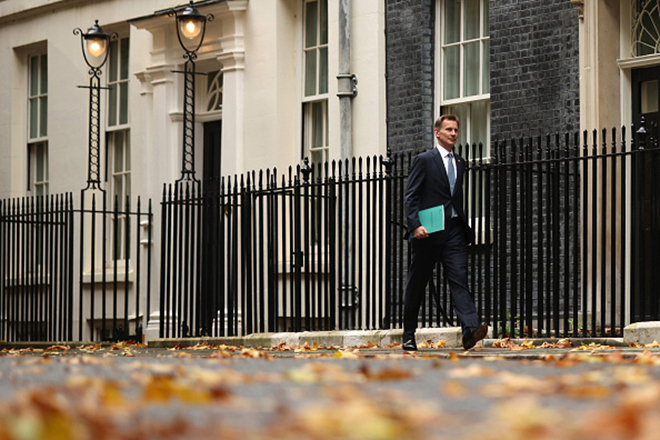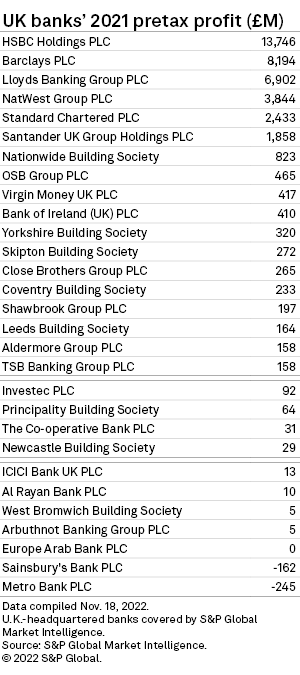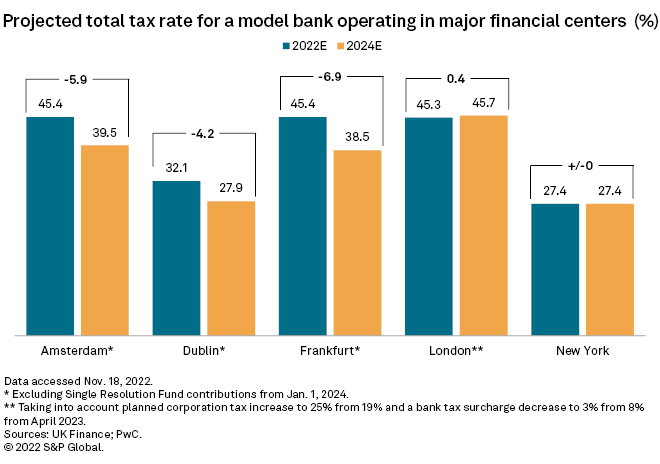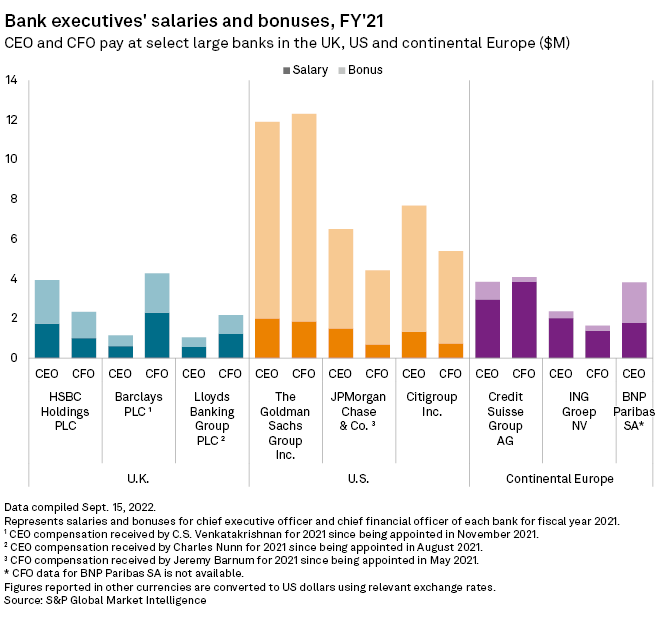
| U.K. Chancellor Jeremy Hunt departs Downing Street to present the autumn budget statement to Parliament on Nov. 17, 2022. |
U.K. Chancellor Jeremy Hunt on Nov. 17 unveiled £55 billion of tax hikes and spending cuts during his autumn budget statement, including an increase in corporation tax to 25% from 19%. A tax surcharge that banks pay on top of this was cut to 3% from 8%, and the profit threshold above which the surcharge will be applied was raised to £100 million from £25 million. While this will reduce the tax burden for smaller banks, the rate for larger lenders will be a percentage point higher.
Countries including Spain and Hungary have introduced a windfall tax on banks — which have seen lending income surge amid rising central bank interest rates — to address a cost-of-living crisis. While Hunt did not impose a windfall tax on banks in his recent budget, this does not mean the sector will not face additional costs.
"For the bigger U.K. banks, the government's [budget] changes can only realistically be viewed as a windfall tax by stealth," Sophie Lund-Yates, lead equity analyst at Hargreaves Lansdown, told S&P Global Market Intelligence. In terms of competitiveness, this could limit bigger players' ability "to run at the front of the pack," the analyst said.
Higher threshold
More smaller banks and building societies in the U.K. may escape the surcharge because of the £100 million threshold. Co-operative Banking Group Ltd. and Newcastle Building Society both reported 2021 pretax profit above the £25 million threshold but below £100 million, S&P Global Market Intelligence data shows — although profits can fluctuate significantly from year to year.

Many medium-sized and large institutions, however, would incur the surcharge. But at 28%, the combined tax rate outlined in Hunt's budget is lower than the sector previously feared.
Hunt's predecessor Kwasi Kwarteng was planning to keep the surcharge unchanged at 8%, which would have meant a total rate of 33% next year. Kwarteng was ousted after announcing a "mini-budget" on Sept. 23 that included large tax cuts and, subsequently, triggered a market meltdown.
The reduction of the bank surcharge was originally proposed in spring 2021 by then-Chancellor Rishi Sunak, who is now prime minister. The government's decision to stick with the original surcharge reduction plan "recognizes the importance of maintaining the international competitiveness of the banking and finance sector," a spokesperson for banking industry trade body UK Finance told Market Intelligence.
Further action
Some market observers believe government should cut taxes further to boost U.K. banks' global competitiveness. Even with the surcharge cut, banks face a 1-percentage-point tax rate rise from next April and will be taxed higher than other U.K. companies as well as peers abroad, EY banking tax specialist Richard Milnes told U.K. news agency PA Media.
The U.K. is the only major financial center still charging a bank levy on top of the surcharge, Milnes said. The levy was introduced in 2011 as part of postcrisis reforms. In 2021, the rate was between 0.05% and 0.10% on banks' balance sheets.
Modeling total tax rates for banks operating in London and in other big global financial centers, accounting firm PwC found that lenders in London currently face higher taxes than peers operating in New York and Dublin. The study, done on behalf of UK Finance, also indicated that in 2024 London taxes will be higher than those in all other major financial centers after a planned discontinuation of contributions EU banks make to the bloc's Single Resolution Fund at the end of 2023.

"Banks and the wider financial services industry serve as the engine of the U.K. economy, attracting overseas investors and making a huge contribution to the country's economic growth," Khalid Talukder, co-founder of London-based foreign exchange management consultancy DKK Partners, said via email. Hunt made the right choice to calm markets after recent turmoil, but the government must also recognize that businesses need support to drive long-term economic growth, Talukder said.
Bonus cap removal
The government also removed an EU-era bank bonus cap, which limited executives' incentive pay to 200% of annual salary, in order to boost the U.K. banking sector's appeal.
U.K.-based bank executive pay is well below that at large U.S. banks, which are not subject to a cap, an analysis by Market Intelligence shows.

Nevertheless, analysts do not expect U.K. bank bonuses to increase sharply in the short term.
"Bumper pay packets" are a good way to attract and retain senior talent in the banking sector in usual times, but "we're in unusual times where uncapped bonuses risk injecting extra money into the economy at a time inflation needs to be brought under control," said Lund-Yates.
"In the current environment, it would not be socially acceptable for executives to increase their compensation," Pauline Lambert, executive director at the financial institutions group of Scope Ratings, told Market Intelligence.



